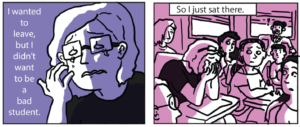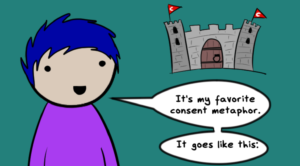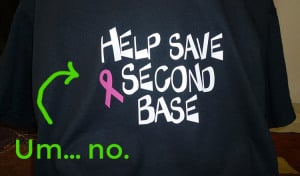
Source: Invisible Disabilities
If I wanted to, I could walk up to a stranger on the street right now and threaten to kill them.
That isn’t a good reason to threaten to kill someone, but I totally could if I wanted—never mind the fact that the person I threaten might actually feel unsafe or tell me off as a result.
This is the kind of thinking I imagine dominates the minds of people who feel the need to defend their right to say whatever they want online, be it hate speech, rape threats, death threats, you name it.
If you’ve spent more than two minutes on the Internet, you’ve probably seen what I’m talking about—trolling, bullying, insincere but deliberately hurtful comments, and other things that no one would say to another person’s face offline.
What’s more, the problem of online harassment is one that disproportionately affects marginalized people. Case in point—an entire fake Twitter campaign dedicated to attacking feminists of color.
After years of seeing n-words, death threats, and suicide jokes littering comment sections and ask boxes around the internet, it’s easy to become desensitized to the indefensible stuff people feel emboldened to say under the cloak of anonymity.
So when people stand up to online harassment—which can include legal action—there’s sometimes a reaction—even from people who would never “troll” themselves—of, “Well, trolls are going to troll. Get off the internet if you can’t handle it.”
Here’s the problem with being that dismissive of online harassment—there are no trolls on the internet.
With the exception of spam bots and pets with Twitter accounts, the internet is entirely populated by human beings who are accountable for their words, are capable of using those words to hurt others, and still exist in the real world where telling another person to go kill themselves doesn’t fly in polite conversation.
The internet isn’t some disembodied place where people should feel okay with delivering abuse without consequences or taking abuse without standing up for themselves. It’s just as real as any other part of our lives, and there are certain things you just can’t say.
The First Amendment, often invoked in defense of harassment online and otherwise, doesn’t give people free rein to say whatever they want to other people in all situations. There’s a difference between censorship and consequences for one’s words.
1. Oppressive Language Doesn’t Promote Free Speech
One of the biggest problems I have with people defending their “right” to use oppressive language—like slurs and misogynistic threats—is that it does the exact opposite of encouraging free speech.
Oppressive language is a silencing tactic, and using it to shut down vocal women, people of color, LGBTQ people, disabled people, and other marginalized groups limits their freedom of expression.
This isn’t to say that rich, white, able-bodied, hetero cis-men don’t deal with online harassment, particularly if they hold unpopular opinions or don’t conform to social norms.
But I’ve seen more people defend their use of the f-word (I’m talking the gay slur) than the f-word I prefer to use (Feminism). I’m also more likely to come across white people defending their right to use the n-word satirically to make fun of racism (???) than I am to encounter white people actually demonstrating what satire means.
In general, online spaces are more hostile to marginalized groups than they are to privileged groups. In other words, they’re just like everywhere else.
Social media is a platform for many people whose stories and voices are poorly represented in the mainstream media. It’s a place where marginalized people can hear each other, vent, connect, and organize around issues that affect them.
Harassment, which no one signs up for when they make an online account, threatens this freedom of expression.
No one wants to start a conversation about in-person misogyny and receive an inbox full of unwanted sexual attention and rape threats. No one wants to vent about the racist nonsense they experienced at work on Twitter only to be met with @ replies intended to mock and silence them.
And people will say that online harassment is the price people pay for posting things publically to the internet. But that’s not much different than saying that walking down the street while black will inevitably lead to racist comments.
The internet isn’t the only place that people make themselves vulnerable or put themselves out there, so racism, sexism, and other forms of hate aren’t more defensible here than in other interactions between strangers.
2. Harassment Isn’t Just “Offensive”—It’s Scary
A couple of years ago, a man named Leo Traynor decided to meet the person who’d been stalking, harassing, and threatening his family online and through mail for over two years. He wrote an article about it, and though the person he met ended up being relatively harmless, Leo had no way of knowing that while he was being harassed. He’d spent two years fearing for his family’s safety because a teenager half way across the world had too much time on his hands.
People who carry out and defend attacking and bullying people online may think of themselves as harmless pranksters, but the person on the receiving end of the abuse has no way of knowing if it’s coming from a lazy kid with a lack of empathy or an unstable person who might follow through on their threatening behavior.
And even if every person spewing bile on the internet were completely harmless otherwise, there’s still the fact that people, you know, have feelings.
Most of us do have to put on our grown up pants and acquire thick skins to deal with harsh and indifferent criticism, but one can only bear witness to so many online threats of dismemberment and rape before losing a chunk of their faith in humanity.
3. Empathy Isn’t Only for People Near You
Confession—writing articles that are meant to be posted online sometimes feels like throwing words into a void. I can’t see or anticipate the impact of the article, who will see it, who will react to it, or how they will respond to it—even well after it’s out there.
It takes some additional time and thought to anticipate what the consequences of my words might be, more than it would take to engage in a face-to-face conversation with someone who’s visibly reacting to what I’m saying.
That’s why I can’t imagine that many of the people saying horrific things online are running around in their day to day lives spewing hate and bile on every stranger that annoys them.
When the consequences of your words are as immediate as they are in the world of flesh and blood, it’s harder to deliver them carelessly.
But when you’re anonymous and it feels like you’re talking to text and pixels? It’s pretty easy to dash out all kinds of nonsense without feeling anything. It’s pretty easy to treat online hate speech and harassment like they’re all part of a game, a joke, a silly past time for people with too much time on their hands.
But that’s not the case. People don’t stop being real on the internet. They don’t stop being real when they’re on the other side of the world. They don’t stop being real when you think they’re annoying or silly or worth mocking.
So to those who attack feminists, or just plain anyone, online—you don’t have to treat every person you interact with online with kid gloves, just like you don’t have to walk on eggshells when you’re talking to people in person.
But if you’re going to direct destructive and hurtful words to someone online, know that, as in the real world, you might be called out, rebuffed, and held accountable. And that’s only fair.
***
People who speak out against or moderate hate speech online aren’t doing so for the sake of censoring dissenting opinions or acting contrary to the First Amendment.
They’re just refusing to tolerate attacks on their own rights and humanity.
And while it’s possible to play the part of a gray faced anon, troll, or sock puppet online, the people on the receiving ends of those words remain human.
And humans react, disagree, get hurt, call each other out, hold each other responsible for the things they say—online and offline.
[do_widget id=”text-101″]
Jarune Uwujaren is a Contributing Writer for Everyday Feminism. A Nigerian-American recent graduate who’s stumbling towards a career in writing, Jarune can currently be found drifting around the DC metro area with a phone or a laptop nearby. When not writing for fun or profit, Jarune enjoys food, fresh air, good books, drawing, poetry, and sci-fi. Read their articles here.
Search our 3000+ articles!
Read our articles about:
Our online racial justice training
Used by hundreds of universities, non-profits, and businesses.
Click to learn more
Most Read Articles
- « Previous
- 1
- …
- 30
- 31
- 32



















